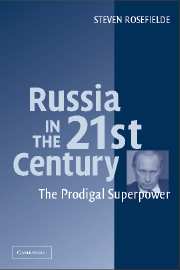Book contents
- Frontmatter
- Contents
- List of Figures and Tables
- List of Acronyms
- Preface
- Acknowledgments
- RUSSIA IN THE 21ST CENTURY
- Introduction
- 1 After “The End of History”
- 2 Prodigal Superpower
- 3 Structural Militarization
- 4 What Could Have Been Done?
- 5 Muscovite Metamorphosis
- 6 Military-Industrial Reform
- 7 National Vulnerabilities
- 8 The Miasma of Global Engagement
- 9 Putin's Choice
- 10 Candor
- Conclusion
- Glossary
- Notes
- Selected Bibliography
- Index
7 - National Vulnerabilities
Published online by Cambridge University Press: 18 December 2009
- Frontmatter
- Contents
- List of Figures and Tables
- List of Acronyms
- Preface
- Acknowledgments
- RUSSIA IN THE 21ST CENTURY
- Introduction
- 1 After “The End of History”
- 2 Prodigal Superpower
- 3 Structural Militarization
- 4 What Could Have Been Done?
- 5 Muscovite Metamorphosis
- 6 Military-Industrial Reform
- 7 National Vulnerabilities
- 8 The Miasma of Global Engagement
- 9 Putin's Choice
- 10 Candor
- Conclusion
- Glossary
- Notes
- Selected Bibliography
- Index
Summary
Analysts who view the world through an idealistic prism have myriad reasons for disbelieving Russia was, is, or will ever be structurally militarized. They suppose that rational Kremlin leaders wouldn't overfund defense and will drastically reduce military outlays if they did because the risks of aggression under the new world order are small. They remind us that neither Russia nor its neighbors (excluding Japan) have explicit irredentist claims against each other, that Moscow's nuclear deterrent precludes conventional war, that the war on terrorism is being won, that democracies won't tolerate militarism, that the nascent middle class is commercially minded, that Russia is becoming a normal civil society that appreciates peace, that its elites want to be respected in Europe, and that Putin's reforms will assure national economic success. As proof, they note that the European Union (EU) and the United States recognize Russia as a market economy and are encouraging it to join them in exploring ways of expanding economic ties, including possible accession to the EU and membership in the World Trade Organization (WTO). They describe Moscow's relations with Teheran and Beijing as nonthreatening because Moscow had no qualms about selling advanced weapons and nuclear reactors to the mullahs and the Chinese People's Liberation Army (PLA). And the Putin–Bush post-9/11 antiterrorist coalition makes a disarming first nuclear strike from Washington “unthinkable.” If Russia's leadership isn't worried about large-scale aggression from America, NATO, China, and Iran, why should it fret about attacks from its other neighbors?
- Type
- Chapter
- Information
- Russia in the 21st CenturyThe Prodigal Superpower, pp. 101 - 111Publisher: Cambridge University PressPrint publication year: 2004



